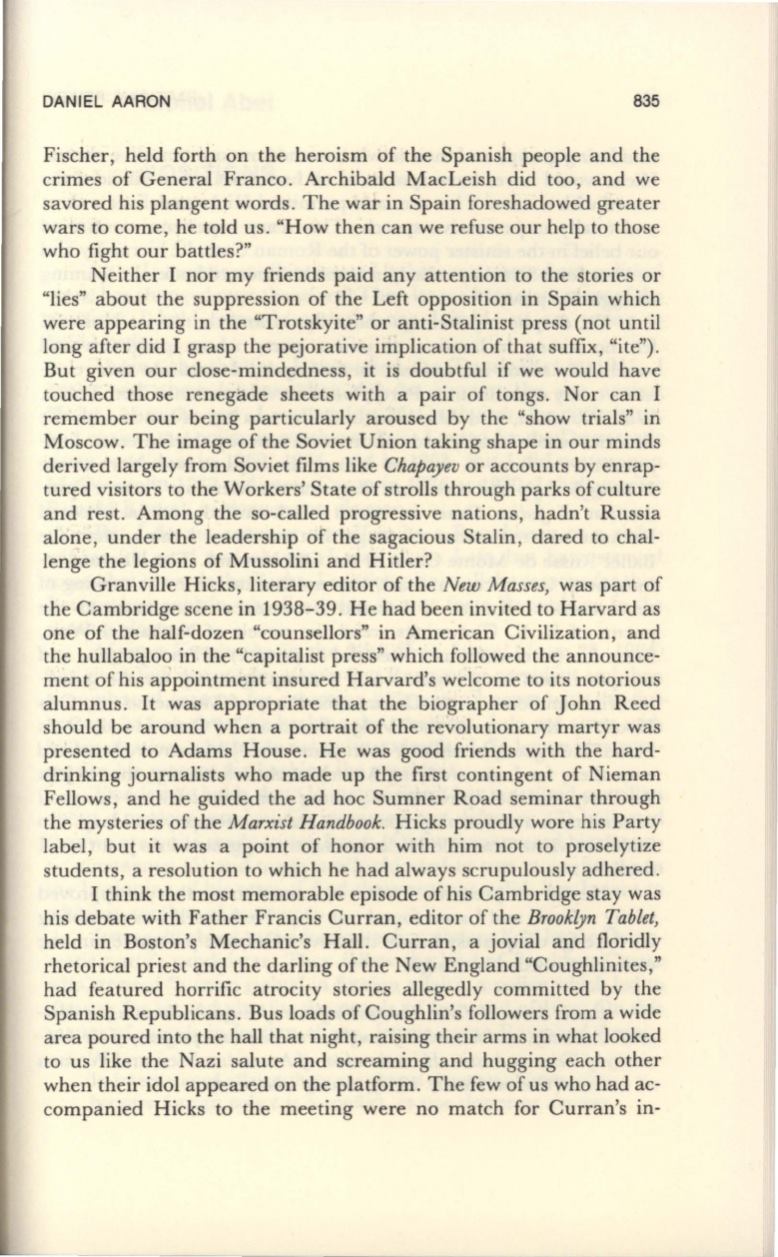
DANIEL AARON
835
Fischer, held forth on the heroism of the Spanish people and the
crimes of General Franco. Archibald MacLeish did too, and we
savored his plangent words. The war in Spain foreshadowed greater
wars to come, he told us. "How then can we refuse our help to those
who fight our battles?"
Neither I nor my friends paid any attention to the stories or
"lies" about the suppression of the Left opposition in Spain which
were appearing in the "Trotskyite" or anti-Stalinist press (not until
long after did I grasp the pejorative implication of that suffix, "ite") .
But given our close-mindedness , it is doubtful if we would have
touched those renegade sheets with a pair of tongs . Nor can I
remember our being particularly aroused by the "show trials" in
Moscow. The image of the Soviet Union taking shape in our minds
derived largely from Soviet films like
Chapayev
or accounts by enrap–
tured visitors to the Workers' State of strolls through parks of culture
and rest . Among the so-called progressive nations, hadn't Russia
alone, under the leadership of the sagacious Stalin, dared to chal–
lenge the legions of Mussolini and Hitler?
Granville Hicks, literary editor of the
New Masses,
was part of
the Cambridge scene in
1938-39.
He had been invited to Harvard as
one of the half-dozen "counsellors" in American Civilization, and
the hullabaloo in the "capitalist press" which followed the announce–
ment of his appointment insured Harvard's welcome to its notorious
alumnus.
It
was appropriate that the biographer of John Reed
should be around when a portrait of the revolutionary martyr was
presented to Adams House. He was good friends with the hard–
drinking journalists who made up the first contingent of Nieman
Fellows, and he guided the ad hoc Sumner Road seminar through
the mysteries of the
Marxist Handbook.
Hicks proudly wore his Party
label, but it was a point of honor with him not to proselytize
students, a resolution to which he had always scrupulously adhered.
I think the most memorable episode of his Cambridge stay was
his debate with Father Francis Curran, editor of the
Brooklyn Tablet,
held in Boston's Mechanic's Hall. Curran, a jovial and floridly
rhetorical priest and the darling of the New England "Coughlinites,"
had featured horrific atrocity stories allegedly committed by the
Spanish Republicans. Bus loads of Coughlin's followers from a wide
area poured into the hall that night, raising their arms in what looked
to us like the Nazi salute and screaming and hugging each other
when their idol appeared on the platform. The few of us who had ac–
companied Hicks to the meeting were no match for Curran's in-


